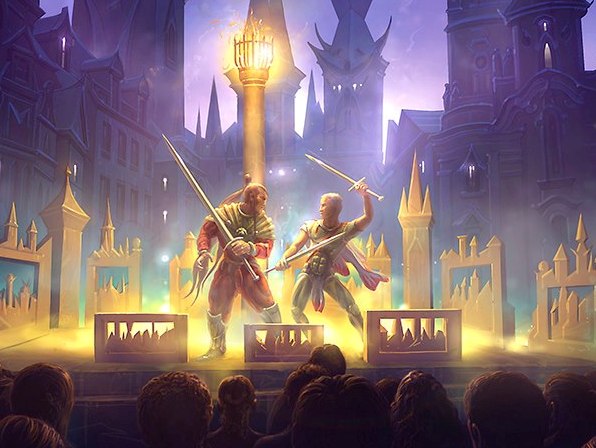Acting (sage study)
Acting is a sage study in the field of Drama, in which the character tells a story through speech, emotional expressiveness, improvisation and physicality. The skill requires an impressive memory, imagination, strength of voice and the ability to intuit the intentions of intelligent beings. Actors train at length in elocution, while gaining a wide knowledge in dramatic literature and humanoid culture.
Quality acting is achieved in association with other actors; fewer than four actors greatly reduce the choice of plays to perform. With five or six actors, usually one or two can be dressed to play multiple minor parts, while four actors are chosen to play the main characters. Even Shakespeare can be performed adequately with six persons, and perhaps a few "spear carriers" — persons without any acting talent, who perform very minor parts — to fill out the cast.
Effective acting requires rehearsal, a process in which actors prepare and practice a performance, exploring the vicissitudes of conflict between characters, testing specific actions and finding means to convey a particular scene. This means that characters studying acting must forgo some of their game time if they wish to organize a meaningful performance.
Sage Abilities
The sage abilities below are those acquired by a character through the study, according to status.
Amateur Status
- Actor I: the character is able to adequately perform supporting roles on stage.
- Foil: the character obtains a non-levelled associate with the actor I sage ability, who yet doesn't have wider knowledge of the study.
- Gift of Memory: the character habitually remembers names, places and phrases spoken by persons in an exact manner, without effort.
- Vocal Range: the character's speaking voice can be heard at a 50% greater distance than a normal person.
Authority
- Actor II: the character is able to adequately perform leading roles on stage.
- Dramatist I: gives the ability to write pantomimes, comedies and morality plays.
- Dramatic Presence: despite the character's charisma, he or she is able to command attention to a certain extent, occasionally allowing a re-roll of a charisma check in some circumstances.
- Inspire Valour: through diction, enable an act of great heroism in a non-player character, so that for a period of time they're able to ignore morale checks.
- Stage Performance: conveys organizational and personal skills necessary to direct and stage a play with others, with requirements for rehearsal time.
- Troupe: the character has the force of will and talent to lead a group with one other lead actor and 2-4 supporting actors.
Expert
- Aura of Empathy: adds 1-4 points to the character's charisma, and if a charisma check is made, the force of the character's gaze is able to force an enemy to break off combat, expressing a wish to parley.
- Monologue: leaping into a speech, the character is able to weave a spell into the speech being given, so that at it's end the spell is cast without the listeners being the wiser until it's too late.
- Spectral Spectators: conjures the illuson of an enthusiastic, ghostly audience that cheers and applauds the character's actions and speeches.
Sage
- Great Presence: the character's voice and expression in times of crisis emits an aura of inspiration that extends in a 23 ft. radius all around; allies in this radius gain advantages on saving throws against fear and charm and are unaffected by morale. The effect also draws in others from a radius of 40 ft. to fill the circle full.
- Reality Maestro: when performing without sets or actors, the character is able to create the illusion in the audience's mind that these are there and even speaking parts within a pre-written play.
